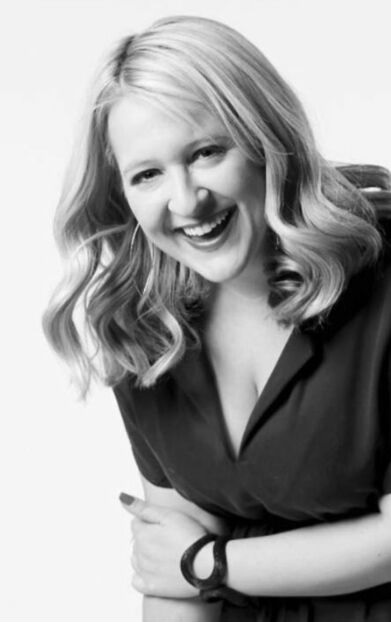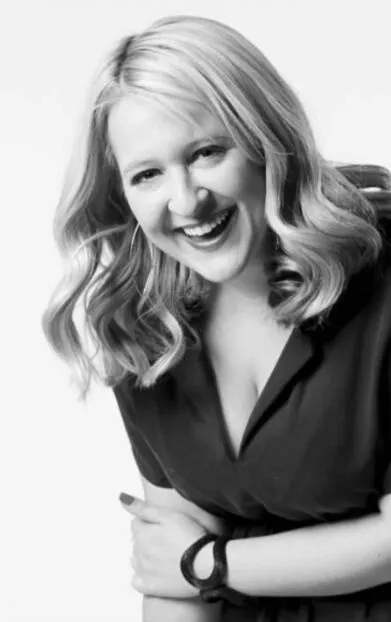
Lindsey Ferrentino is a prolific playwright who writes with, according to The New York Times, “a muscular empathy which seeks to enter the minds of people for whom life is often a struggle of heroic proportions”. She graciously answered some of Marketing and Communication Director Helen Harvester’s burning questions about This Flat Earth.
Very few shows have a 12 or 13-year-old lead. Why did you choose Julie as the central character?
I found a journal from when I was in middle school with an entry where a teacher asked us to write down things that we were grateful for. And one of the things that I wrote was that I was grateful I didn’t grow up during a time of war. I wrote that on Sept 10, 2001, and of course the next day September 11 happened. And the next day or so, I looked back at the journal entry, and as a very young, solipsistic person, thought I had “jinxed” the nation and caused 9/11 to happen, which obviously on one level I knew at the time was ridiculous, but thought maybe part of it was true. I was really interested in writing about that time where you are self-aware to know adult things, but also sometimes have the mind of a child… where you have superstitious fears and share inappropriate thoughts with no filter.
I also remembered that there was a girl in my middle school that had died, who I didn’t really know that well, but I went the funeral, and why did I go? She was really beautiful, and the rumor was that she was a model. She died in a car accident on the way to her birthday party. And I really didn’t know her, but I just was so affected by that. And I remember, no one would sit in the chair that she sat in at school; it was a classroom of black chairs, but her chair was orange, and people were creeped out by that — we thought, “Maybe that means something, maybe she was doomed.” It was the way a child’s brain wraps around adult things that got me interested in writing about this age group.
You write for this age very well. I’m used to shows with children who are either too articulate or too inarticulate, but you’ve found a mix of naivete and intelligence in these two kids that feels completely authentic. How did you find their voices?
Well, I used to be twelve and I know some very smart twelve-year-olds. So I think it’s just about tapping into that part of yourself that’s a bit more unfiltered, emotionally reactive, that suffers fewer fools, etc.
I am particularly interested in the heartbreaking moment when Julie discovers there have been many other school shootings. It gives me chills just reading it, maybe because as an adult reading the play it’s such an unexpected piece of information to be missing? Where did that moment come from in your writing process?
Yeah, I think this is the moment that’s the most important to me in the play. The play is really about tragedy, but from a kid’s perspective… and from a kid who is not processing grief in the “right” way. And by that, I mean in the way that adults process grief. That impulse is still very much at the heart of the play. I kept thinking about that moment, or many moments when I realized that — bad things happen and there isn’t really anything anyone can do about them… And yet, with the issue of gun control, this mindset has led to complacency and acceptance of a true nightmarish horror. So I think that moment is about reminding the audience that there used to be a time when shootings weren’t so frequent, that there is a moment for every child of horror when they realize the adults aren’t doing anything.
This play was written pre-Parkland and then on day three of our rehearsal process in New York, the shooting in Parkland happened. And this was the first time that you saw students just say “We’ve had enough of living like this.” Students were asking adults why they hadn’t fixed this yet? As young students became activists it might make the audience less likely to believe that a young student like Julie wouldn’t know about the history of these type of horrors. And yet when I speak with parents after the show, I’m told about those sorts of moments they have with their children.
I think that moment is what the play hinges on though — going back to a time when you are first realizing these things.
What are your hopes for our production? What does a successful telling of this story look like to you?
Well, I think a successful telling of this story is one where the audience gets onboard with that moment, where they can still believe in a child’s innocence getting ruined, where it does startle them and make them remember a time when they didn’t just accept things as they are. I hope the production reminds the audience that there is so much more we — as adults — can be doing — from gun control to climate change — to make the world feel just a little safer to those who are born into it.
